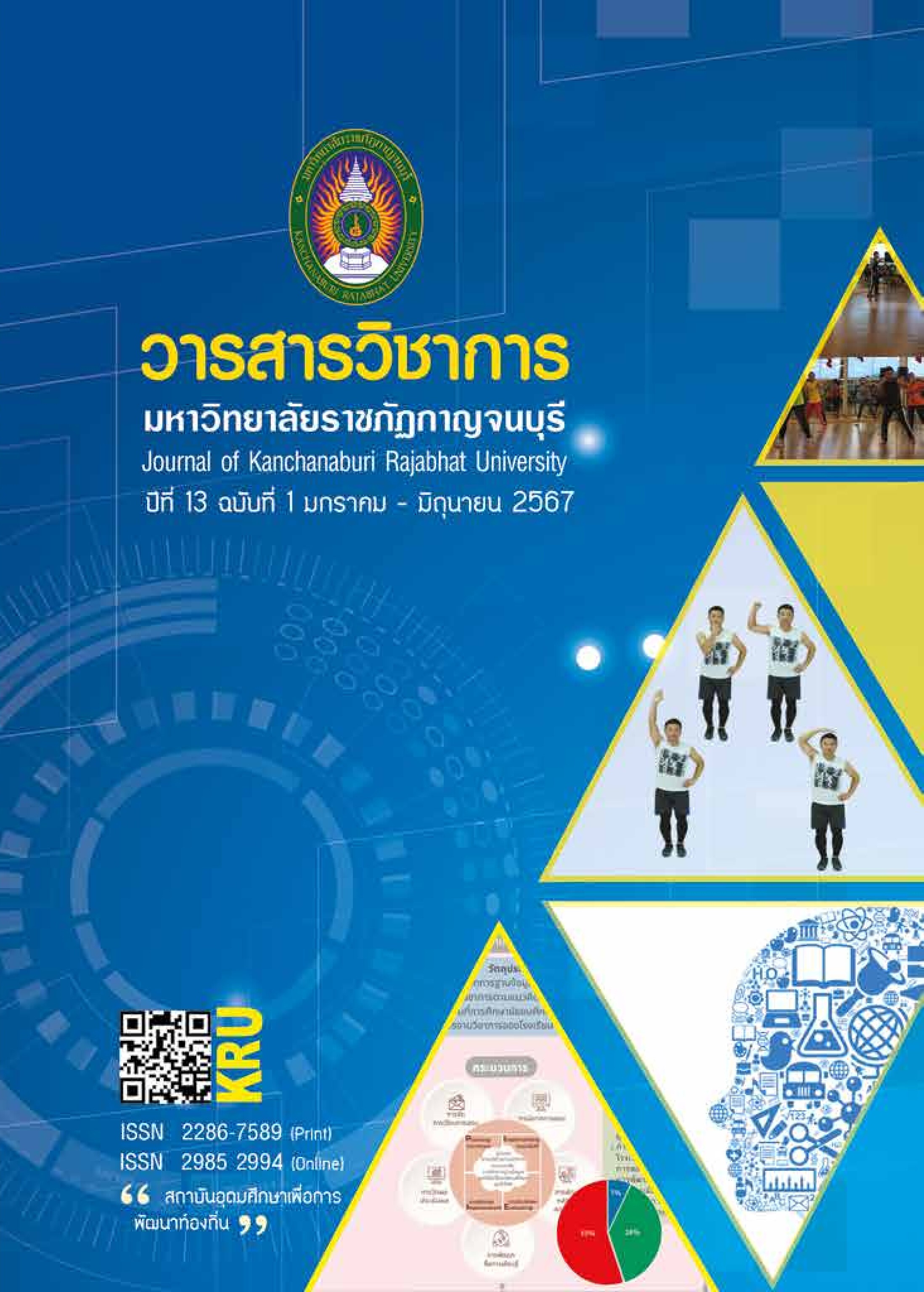ความคิดเห็นของผู้มีส่วนได้ส่วนเสียต่อการพัฒนาหลักสูตรวิทยาศาสตรบัณฑิต สาขาวิทยาศาสตร์การกีฬาและการออกกำลังกาย
Main Article Content
Abstract
This research was designed using quantitative and qualitative methods. This research aimed to study stakeholders’ opinions on the development of a Bachelor of Science in Sports and Exercise Science. The research tools comprised a questionnaire and semi-structured interviews. The Sample group of key informants totaled 902 people derived by purposive selection. The data were analyzed by percentage, mean, and standard deviation. The data were descriptively summarized and explained based on the research concept. The research results were as follows:
The stakeholders’ opinions on graduate characteristics and the development of the Bachelor of Science in Sports and Exercise Science could be categorized into 5 important areas:
The Knowledge aspect is at a high level (= 4.01, S.D. = .83). This includes knowing basic theories and principles in sports science and exercise, equipment use, technology, and leadership in sports and exercise.
1. The Skills aspect is at a high level (= 4.02, S.D. = 0.83). This includes leadership skills in exercise and sports, exercise skills to improve health and physical fitness, language, and technology skills.
2. The Ethics aspect is at a high level (= 4.34, S.D. = 0.73). This includes having morality, ethics, honesty, generosity, compassion, kindness, respect for rules and regulations, and the ability to adapt to live with others in the society.
3. The Personal Characteristics aspect is at a high level (= 4.30, S.D. = 0.73). This includes good human relations, politeness, a service mind, and leadership in sports science and exercise.
4. The curriculum management, teaching, and learning should be arranged in conjunction with professional experience training, with the focus on practicality and the analysis of basic knowledge that can be applied in various situations appropriately.
Article Details

This work is licensed under a Creative Commons Attribution-NonCommercial-NoDerivatives 4.0 International License.
References
ธัชวัสส์ ตั้งตรงขันติ ภาคภูมิ พิลึก วิภาวัลย์ เชาวน์สุจริต เกษศิรินทร์ กิตติพงษ์ภากรณ์ สิริกาญจน์ สันติเสวี วรวิทย์ รัตนเสถียรกิจ สมยศ บ่อน้อย และ ปรีติวัฒน์
วรรณบุษปวิช. (2560). การประเมินหลักสูตรวิทยาศาสตรบัณฑิต สาขาวิชาวิทยาศาสตร์การกีฬาและการออกกำลังกาย ปรับปรุง พ.ศ. 2555
คณะวิทยาศาสตร์และเทคโนโลยี มหาวิทยาลัยราชภัฎนครราชสีมา. วารสารราชพฤกษ์, 15 (1), 49-55.
ธิติ ญาณปรีชาเศรษฐ นิวัฒน์ บุญสม วรรณวิสา บุญมาก คุณัตว์ พิธพรชัยกุล นภสร นีละไพจิตร นรินทรา จันทศรก มลรัตน์ หนูสวี. (2565). การประเมินหลักสูตร
วิทยาศาสตรบัณฑิต สาขาวิชาวิทยาศาสตร์การกีฬา คณะศึกษาศาสตร์ มหาวิทยาลัยศิลปากร (หลักสูตรปรับปรุง พ.ศ. 2560). วารสารศึกษาศาสตร์
มหาวิทยาลัยศิลปากร, 20 (2), 382-413.
บัณฑิตา อินสมบัติ และปราณี เนรมิตร. (2563). แนวทางการพัฒนาหลักสูตรระดับอุดมศึกษาทีสอดคล้องกับการพัฒนาประเทศสู่ Thailand 4.0: กรณีศึกษา
มหาวิทยาลัยราชภัฏนครสวรรค์. วารสารมหาวิทยาลัยราชภัฏมหาสารคาม. 14 (2), 159-170.
บุญธรรม กิจปรีดาบริสุทธิ์. (2549). สถิติวิเคราะห์เพื่อการวิจัย (พิมพ์ครั้งที่ 4). กรุงเทพฯ: จามจุรีโปรดักท์.
ประกาศ เรื่อง แผนพัฒนาเศรษฐกิจและสังคมแห่งชาติ ฉบับที่ 13 (พ.ศ.2566 - 2570). (2565, 1 พฤศจิกายน). ราชกิจจานุเบกษา. เล่ม 139 ตอนพิเศษ 258 ง.
ประกาศ เรื่อง ยุทธศาสตร์ชาติ พ.ศ. 2561-2580. (2561, 13 ตุลาคม). ราชกิจจานุเบกษา. เล่ม 135 ตอนที่ 82 ก. หน้า 9.
ประกาศคณะกรรมการนโยบายการกีฬาแห่งชาติ เรื่อง แผนพัฒนาการกีฬาแห่งชาติ ฉบับที่ 7 (พ.ศ. 2566 - 2570). (2566, 30 มีนาคม). ราชกิจจานุเบกษา. เล่ม
ตอนพิเศษ 75 ง. หน้า ข.
ประกาศคณะกรรมการมาตรฐานการอุดมศึกษา เรื่อง รายละเอียดผลลัพธ์การเรียนรู้ตามมาตรฐานคุณวุฒิระดับอุดมศึกษา พ.ศ. 2565. (2565, 9 กันยายน).
ราชกิจจานุเบกษา. เล่ม 139 ตอนพิเศษ 212 ง. หน้า 35 – 36.
พระราชบัญญัติมหาวิทยาลัยการกีฬาแห่งชาติ พ.ศ. 2562. (2562, 22 พฤษภาคม). ราชกิจจานุเบกษา. เล่ม 136 ตอน ที่ 67 ก. หน้า 128 – 129.
พิศิษฐ ตัณฑวณิช และพนา จินดาศรี. (2561). ความหมายที่แท้จริงของค่า IOC. วารสารการวัดการศึกษา มหาวิทยาลัยมหาสารคาม. 24 (2), 3-12.
วิชัย วงษ์ใหญ่. (2554). การพัฒนาหลักสูตรระดับอุดมศึกษา (พิมพ์ครั้งที่ 2). กรุงเทพฯ: อาร์แอนด์ ปริ้นท์.
สิรวิชญ์ สิริศักดิ์เกษมพร. (2556). บุคลิกภาพภายนอกและทักษะความรู้ความสามารถส่งผลต่อการตัดสินใจเลือกใช้ครูฝึกส่วนตัวในสถานออกกำลังกาย.
[วิทยานิพนธ์ปริญญาบริหารธุรกิจมหาบัณฑิต ไม่ได้ตีพิมพ์]. มหาวิทยาลัยกรุงเทพ.
Best, J.W. (1981). Research in Education. 4th ed. New Jersey: Prentice-Hall


